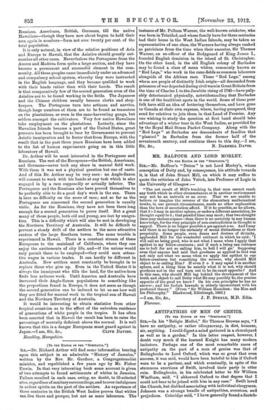ITo THE EDITOR OP THE " SPECTATOR.")
SIR,—Dr. Richard Arthur will find some information bearing upon this subject in an admirable " History of Jamaica," written by the Rev. Mr. Gardner, a Congregationalist minister, and republished a few years ago by Mr. Fisher Unwin. In that very interesting book some account is given of two attempts to found settlements of whites in Jamaica. Failure resulted in each case, owing, no doubt, to ill-selected sites, regardless of sanitary surroundings, and to over-ind ulgence in ardent spirits on the part of the settlers. An experience of three centuries in the British West Indies proves that whites can live there and prosper, but not as mere labourers. The instance of Mr. Pelham Warner, the well-known cricketer, who was born in Trinidad, and whose family have for three centuries had their home in the West Indian Islands, may be taken as representative of one class, the Warners having always ranked as patricians from the time when their ancestor, Sir Thomas Warner, an ex-officer of the Bodyguard of King James I., founded English dominion in the island of St. Christopher. On the other hand, in the old English colony of Barbados may be found a class of mean whites, commonly known as " Red Legs," who work in the cane-fields as common labourers alongside of the African race. These "Red Legs," among whom are people of distinctly Irish origin—all descended from prisoners of war deported during civil wars in Great Britain from the time of Charles I. to the Jacobite rising of 1745—have palp- ably deteriorated physically, notwithstanding that Barbados is one of the healthiest spots in the world. Some of these poor folk have still an idea of bettering themselves, and have gone to Canada at their own expense, where, having prospered, they send for relatives to join them in that Land of Promise. Any one wishing to study the question at first hand should take advantage of a winter tour in the West Indies, as provided for by the Royal Mail Steam Packet Company. Along with the " Red Legs " at Barbados are descendants of families that " planted " in Barbados from the former half of the seventeenth century, and continue there to this day.—I am,














































 Previous page
Previous page